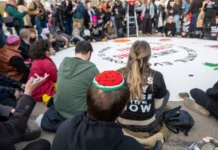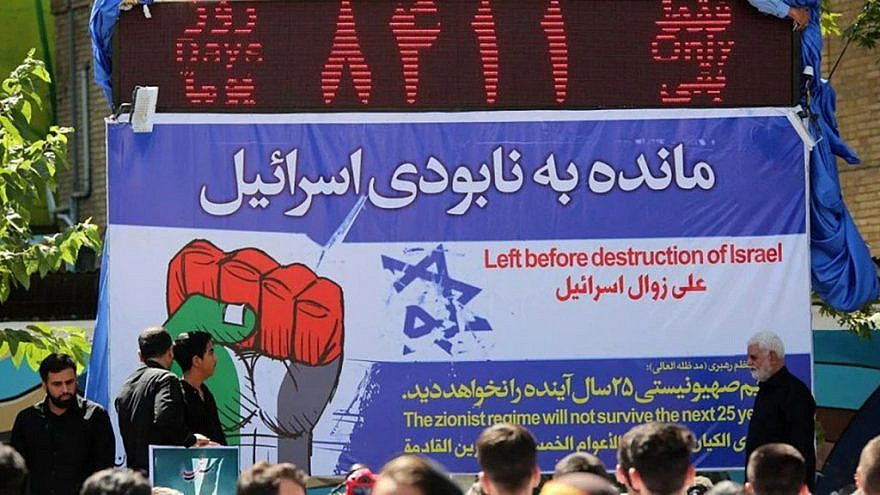Seven Israeli Jews, including two minors aged 16 and 17, as well as a father and son, have been in custody since September on suspicion of serious espionage for Iran in exchange for hundreds of thousands of dollars.
On Monday, a prosecutor’s statement was submitted against them with a request to extend their detention until the end of the proceedings, while the security establishment is investigating how they operated for two years under the radar of the Shin Bet, IDF, police and Mossad.
On Friday, the prosecution is expected to file an indictment against them in the Haifa District Court for a series of serious security offenses.
The suspects are Aziz Nisanov, Alexander Sadikov, Yigal Nisan, Vyacheslav Gushchin, Yevgeny Yoffe and two minors. They are all Israeli Jews who immigrated from Azerbaijan.
The adults among them did not serve in the IDF and were not employed at security facilities that they documented as part of their espionage activities. They are residents of Haifa’s bayside suburbs and Haifa who received their citizenship under the Law of Return and through other methods that are under investigation.
Aiding the enemy during wartime
The seven are expected to be charged with aiding the enemy during wartime, an offense punishable by death or life imprisonment. The police reject the assessment that the seven were part of Hamas’s decision to invade the Gaza border communities on Oct. 7, 2023, but emphasize that “every missile fired toward the country in the last two years from Gaza, Lebanon or Iran reached places they photographed and sent to the Iranians, especially in the last year.”
Among other targets, the suspects photographed the Golani Brigade training base near Binyamina, where a Hezbollah drone killed four IDF soldiers on Oct. 13.
The investigation reveals that this is an espionage case, directed by two Iranian agents, which lasted about two years and was exposed a few months ago following information received by the Shin Bet. Due to the concern that the espionage efforts would harm Israelis, the investigation of the case became public before the completion of the covert investigation against them. The seven were arrested on Sept. 19.
“This is one of the most serious events investigated ever,” said Ch. Supt. Yaron Binyamin, the head of the security division at the Lahav 433 Major Crimes Unit. “It seems we have too many such people in the country, and it’s very troubling.”
From the investigation, it emerged that the seven carried out between 600 and 700 espionage missions for Iran over two years. They documented sensitive security facilities, military bases and human targets, the last of which was the commander of the Nevatim Airbase near Beersheva and his son.
According to investigators, in the Iranian attack that took place on Oct. 1, 2024, the Islamic Republic fired ballistic missiles across Israel toward targets that the seven had documented, including the Nevatim and Ramat David Airbases and the Mossad headquarters in Glilot. Additionally, it was revealed that after the missile attack, the seven were sent by Iran to check the accuracy and damage caused to improve in the future.
The police and Shin Bet are investigating whether the seven collected information on and surveilled Prime Minister Benjamin Netanyahu’s private home in Caesarea, which was targeted by a Hezbollah drone on Oct. 19.
During questioning, the seven said they “became addicted to the money paid to them” totaling hundreds of thousands of dollars transferred to them in cryptocurrency, in an encrypted manner, through exchange stores in the country, and several times through Russian couriers who came to the country and transferred the funds to them in meetings they held with them.
“We know about the systematic way in which the group operated,” Binyamin said. “We caught dozens of documents listing which facility to photograph, which facility to gather information on, and how much money they were supposed to earn from it. The method of operation was receiving a mission, such as photographing, driving to the location, unloading from the vehicle, taking a high vantage point, photographing, and transferring the documentation in short ranges to Iran using encrypted software.”
The group’s leader was recruited in Turkey in the past and had already activated Israelis in other cases that were recently exposed. Unlike other cases, this involves espionage that lasted about two years. It should be noted that the Iranians do not work directly with Israelis, and to recruit them, they operate through intermediaries. In this case, too, the Iranians used a Turkish intermediary named Al Hassan who had activated Israelis in short espionage missions in the past. As far as is known, arrests related to the case have recently been made in Turkey and Azerbaijan.
Thirsty for missions
Details of the investigation reveal that the seven knew at some stage or another that the materials they collected were being transferred to Iran. The severity of the acts became clear during the overt investigation and in the covert wiretapping placed on them.
“We clearly understood that they were thirsty for missions because they were thirsty for money. They asked each other, ‘So when is the next mission?’ Sometimes they performed three or four missions a day,” Binyamin said.
“The method was to receive a mission in an ascending order. Two years ago, they received simple missions and then they gradually increased [in severity]. This is an exceptional event by any measure. I don’t know of a terror cell that operates systematically and primarily for such a long period and executes [its missions]. I don’t know whether to be happy or sad on this day. On one hand, there’s satisfaction, on the other hand, it’s very troubling in what reality we live,” the police commander said.
Three of the seven were caught red-handed while they were near the home of the commander of the Nevatim base and were on a mission to monitor him and his son.
“This was the mission that led to the decision to break into the investigation, because we didn’t want to take the risk of harm to human life. They were directed by the Iranians on which day and at what time to photograph the home of the Nevatim commander. This was supposed to happen at the time his son was expected to leave the house,” Binyamin said, adding that unlike other cases where contact with the Iranians was, among other things, through social networks, in this case, the contact with them was physical. “The investigation material is crazy,” he added.
A senior Shin Bet official said, “As part of the investigation, many materials were seized that were collected by the members of the infrastructure and transferred to Iranian agents, including photographs and videos of many IDF bases across the country, ports, energy infrastructures in Israel, all while the State of Israel is fighting on several different fronts. The assessment is that the activities of the infrastructure members led to security damage to the state’s security.”
The police said in a statement: “During the overt investigation, the severity of the events and their scope were revealed, which are among the most serious that the State of Israel has known. The suspects acted with knowledge of their actions and out of greed for money—and harmed the State of Israel and its citizens.”
Originally published by Israel Hayom.




























